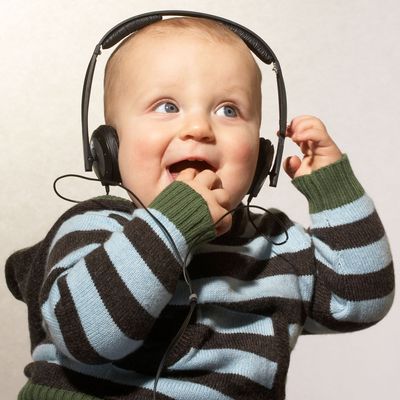
Q: How do you make a baby laugh?
A: Get a professional musician together with some psychologists, brush up on the baby-laughter literature, write some tunes, write some lyrics, and cobble it all together into a research-backed piece of sonic science.
There are easier ways, sure, but this one’s still pretty cool: As Caspar Addyman, a developmental psychologist at the University of London, recently explained in the Conversation, he and his colleagues — including singer Imogen Heap — have created the first song engineered specifically to elicit adorable baby giggles.
At the beginning of the project, Addyman wrote, the team put together a few requirements: First, the song had to have “musical devices like drum rolls, key changes and rising pitch glides to provide opportunities for anticipation and surprise.” It also had to have a fairly fast pace, to account for the fact that a baby’s heart rate is quicker than an adult’s (research has shown that we’re drawn to songs whose tempo falls in the same range as our heart rate). And the last requirement was that it be recorded by a female vocalist, because babies tend to prefer women’s voices. Ideally, it would also be recorded in the presence of a baby, as research and real-life experience have shown that our voices naturally change when we’re talking to an infant.
After Heap created a few tunes that fit the bill, it was time to test them out:
Some 26 babies between six and 12 months then came to our lab with their mums and a few dads to give us their opinion … We knew which song the mums liked because we could ask them. We also asked the parents to tell us what their babies preferred best, because they are the experts on their own babies. But we also filmed the babies’ responses and coded the videos for laughs, smiles and dancing.
Once they had the winning melody, the next step was to fill in the lyrics. Addyman and his colleagues surveyed around 2,500 parents to determine the noises that evoked the most positive response in their babies, including animal impressions, raspberries, “boo,” and the sound of other babies laughing. Because laughing is typically a social experience, the team built in a little something for the parents, too, weaving the baby-friendly noises into “a joyous tale of how we love our little babies wherever we are — from the sky to the ocean, on a bike or on a rocket.” (A bonus: “The transport theme permitted lots of plosives “beep, beep” and bouncing actions,” Addyman noted.)
Down the road, Addyman wrote, he and his colleagues plan to use the song in a series of follow-up studies about babies’ responses to music. In the meantime, though, the results of this particular experiment are the perfect complement to the findings of another, earlier study: Babies love to dance. Finally, they have some beats just for them.




